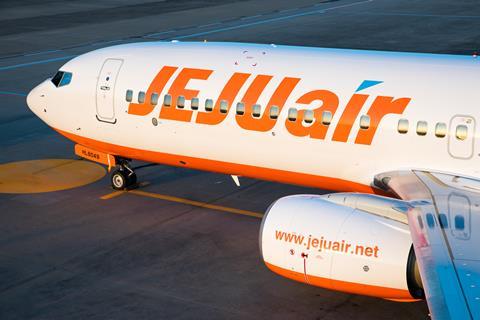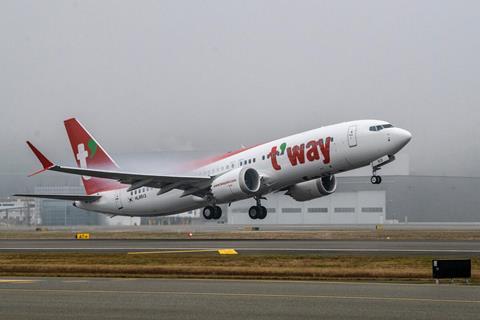South Korean low-cost operators felt the impact of rising costs in the second-quarter, with two swinging to losses for the first time since 2022.
Jeju Air and T’way Air both reported operating losses for the three months ended 30 June, while Jin Air eked out a small quarterly profit. This was despite an increase in revenues on the back of healthy passenger travel demand.

The airlines blamed rising in costs – especially in fuel and manpower – as well as foreign exchange losses, for their poorer performance, with Jin Air warning that competition in the coming months is “likely to intensify”.
For the second quarter, Jeju Air reported an operating loss of W6.9 billion ($7 million), compared to a W23 billion profit in the year-ago period.
The airline saw a 16% rise in revenues to W428 billion, helped by a 13.6% increase in passenger volumes. Jeju Air also saw a 15% jump in ancillary revenues during the quarter.
However, rising operating costs outpaced revenue growth, with the airline noting that “the burden of costs related to foreign currency” has also increased, given the weaker Korean Won against the US Dollar.
The airline last reported a second-quarter operating loss in 2022, when South Korea still had some Covid-19 restrictions.
As for T’way Air, it disclosed an operating loss of W22 billion, swinging from a W19.6 billion profit in the year-ago period.
Like its compatriots, T’way improved its quarterly revenue, with international passenger traffic seeing the strongest growth. The airline saw a 13.9% rise in revenue to W3.2 trillion.
“Profitability declined due to cost pressures, including labour expenses,” T’way adds.

Meanwhile, Jin Air saw a 95% plunge in its second-quarter profit, to W900 million, despite seeing a 19% increase in revenues to W308 billion. It also reported a 26% jump in costs to W307 billion.
The sister unit to Korean Air saw a 22% rise in international passenger traffic, offset by a 9% decline in domestic traffic. International capacity also grew 19% year on year.
The carrier has flagged concerns about a looming recession, as well as “increased external volatility”, especially in foreign exchange rates and fuel costs.
To this end, Jin Air says it will “promote” cost reduction and increase operational efficiency with newer aircraft.
Jin believes its performance will rebound in the third quarter with the peak summer travel period and holiday season in full swing.


























